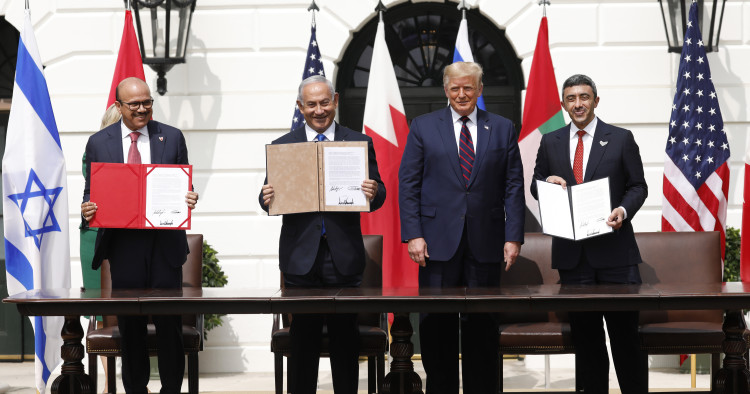The prospect of Syria and Lebanon joining the Abraham Accords marks a seismic shift in Middle Eastern geopolitics, with far-reaching implications for regional alliances, security, and economic prospects.
Recent diplomatic overtures and leadership changes in both countries have opened the door to normalization with Israel, a move that would have been unthinkable just a few years ago. Israel’s ambassador to the United States, Yechiel Leiter, suggested that Syria and Lebanon could join the Abraham Accords and normalize relations with Israel before Saudi Arabia.
Background: The Abraham Accords and Their Evolution
The Abraham Accords, initiated in 2020, established formal relations between Israel and several Arab states, including the UAE, Bahrain, and Morocco. The agreements were driven by shared security concerns particularly regarding Iran and the promise of economic cooperation and technological exchange.
While the initial wave of normalization largely bypassed the Israeli Palestinian conflict, it solidified the U.S. role as a regional broker and offered signatory states access to American and Israeli technology and investment.
Despite the upheaval following the October 2023 Gaza conflict, the Accords have endured, and momentum for further expansion remains, especially as the U.S. and regional actors seek to recalibrate alliances in a changing landscape.
Also Read: Indeed! Donald Trump Deserve ‘Nobel Peace Prize’ for ‘Abraham Accords’
Syria’s Path to Normalization
On May 14, 2025, US President Donald Trump met Syria’s interim President Ahmed al-Sharaa, encouraging him to join the Abraham Accords and offering to lift all US sanctions as an incentive.
Syria’s potential entry into the Abraham Accords is closely tied to dramatic changes in its leadership and strategic calculus. Ravaged by over a decade of civil war, the country remains diplomatically isolated, heavily sanctioned, and economically fractured.
The rise of President Ahmed al-Sharaa, who replaced Bashar al-Assad, has brought a more moderate tone to Damascus which is evident in Syria’s recent readmission to the Arab League in 2023. Al-Sharaa’s willingness to engage with the U.S. and Israel reportedly in exchange for the lifting of crippling sanctions and access to reconstruction funds signals a pragmatic approach to ending Syria’s international isolation.
Saudi Arabia has played a key role in encouraging this shift, seeking stability in Syria after years of conflict and hoping to weaken Iran’s regional influence. The U.S. has responded by offering incentives, including sanctions relief, contingent on Syria’s stabilization and progress toward normalization.
However, the legitimacy and capacity of Syria’s transitional government remain in question, with deep governance voids and risks of renewed conflict still present.
Lebanon’s Calculus: Opportunity Amid Crisis
Lebanon, long mired in economic collapse and political deadlock, is also being considered as a potential signatory to the Abraham Accords. The election of Joseph Aoun as president and the formation of a new government under Nawaf Salam have created a window for reform and international engagement.
Israeli officials have expressed optimism that Lebanon could move toward normalization even before Saudi Arabia, citing the country’s urgent need for economic recovery and the opportunity to emerge from its status as a failed state.
A critical factor in Lebanon’s calculus is the future of Hezbollah, which continues to wield significant political and military power. Any normalization with Israel would require a recalibration of Hezbollah’s role or a significant shift in Lebanon’s internal balance of power.
Recent moves by Syria’s new government to curb arms smuggling to Hezbollah may signal a broader regional realignment that could facilitate Lebanon’s entry into the Accords.
Also Read: Abraham accords 2.0 starts from here
Strategic Implications and Challenges
If Syria and Lebanon join the Abraham Accords, the regional power structure would be profoundly altered:
Weakened Iranian Influence: Both countries’ normalization with Israel would undermine Iran’s regional network, particularly its support for Hezbollah and other proxy groups.
Economic Incentives: Access to reconstruction funds and international investment could accelerate post-war recovery in Syria and economic stabilization in Lebanon.
Security Realignment: The U.S. and Israel would gain new security partners, potentially reducing the risk of broader conflict and creating new avenues for intelligence sharing and counterterrorism.
Palestinian Issue: The move could further marginalize the Palestinian cause, as more Arab states prioritize national interests and economic recovery over solidarity with the Palestinians.
However, significant obstacles remain. The legitimacy of Syria’s transitional government is fragile, and Lebanon’s political landscape is deeply fragmented. Popular opposition, especially among groups aligned with Iran, could derail or delay normalization.
Furthermore, the durability of any agreement will depend on sustained international engagement and the ability of new leadership in both countries to deliver on reforms and security commitments.
The potential accession of Syria and Lebanon to the Abraham Accords would represent a historic realignment in the Middle East, with the promise of economic renewal and reduced conflict, but also the risk of internal backlash and regional instability.
As diplomatic negotiations continue, the region watches closely and the outcome could reshape the Middle East from Morocco to Iran.
Donald Trump has played a decisive and highly visible role in advancing the prospect of Syria and Lebanon joining the Abraham Accords. Trump’s role has been that of an active broker offering sanctions relief, direct engagement, and economic incentives to bring Syria and Lebanon into the Abraham Accords, with the aim of redrawing the region’s strategic map and strengthening Israel’s position.








